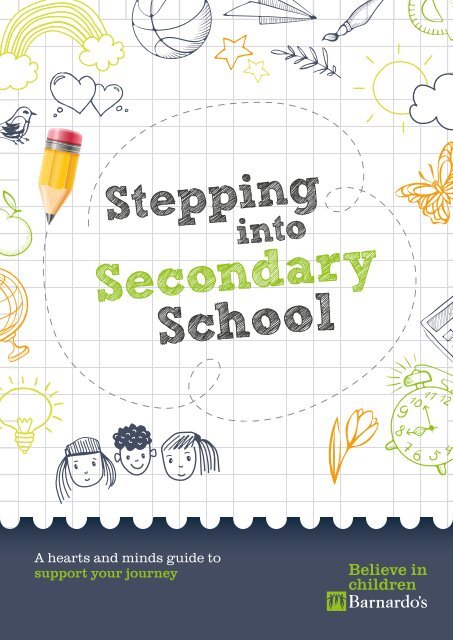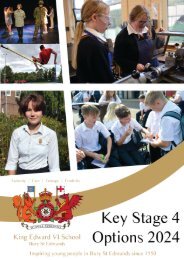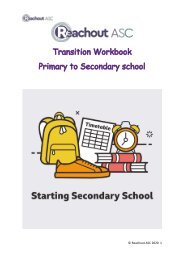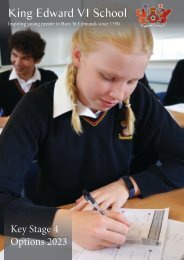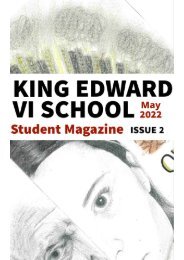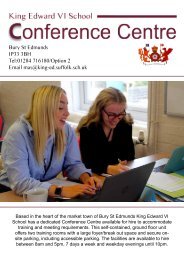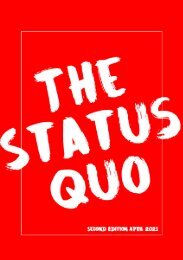Barnardos-Year-6-Transition-Booklet
You also want an ePaper? Increase the reach of your titles
YUMPU automatically turns print PDFs into web optimized ePapers that Google loves.
Stepping<br />
into<br />
Secondary<br />
School<br />
A hearts and minds guide to<br />
support your journey<br />
Barnardo’s transition booklet / Page 1
Welcome<br />
Top Tips for a great start<br />
Welcome to your Stepping into<br />
Secondary School guide.<br />
This guide will help you to explore your thoughts and<br />
feelings about your move to secondary school. We hope<br />
it will make you feel more confident and prepared for<br />
your new start.<br />
You may need help from an adult to work through this<br />
guide or prefer to complete it on your own. Sharing how<br />
you feel with someone means they will be able to help<br />
you if you need it.<br />
The key ideas you will find in this booklet come<br />
from a programme called WRAP which stands for<br />
Wellness Recovery Action Plan. Anyone can use<br />
WRAP to help keep themselves feeling well.<br />
Look out for this sign to read more of our<br />
top tips as you prepare for secondary school<br />
Rules<br />
School rules are<br />
there so that you can<br />
learn in a safe and<br />
productive way. You can<br />
find your schools rules<br />
in your planner.<br />
Money<br />
Top Tips<br />
Many schools have<br />
introduced a cash-less<br />
system. Some schools<br />
use a pre-paid card where<br />
you top up at a machine<br />
in school. Others use a<br />
fingerprint system and<br />
some still use cash. Find<br />
out what system is used<br />
in your school.<br />
W<br />
When you see this symbol it means the idea<br />
we are sharing is from the WRAP programme.<br />
Moving from primary to secondary school is an exciting<br />
time, which can also bring new challenges. This guide will<br />
help you to prepare for this next step.<br />
There is space in this guide for you to record your ideas<br />
and make plans. You can be as creative as you like and draw<br />
pictures, make notes and even paste in information you find.<br />
We make no apologies for asking you to focus on you in these<br />
pages. You are important. You are special. You are unique.<br />
Equipment<br />
Your tutor and planner will tell you what equipment you<br />
will need – from stationary to sports kits. Remember to<br />
check your planner before the next day to make sure you<br />
have the correct equipment with you.<br />
Homework<br />
You will be encouraged<br />
to write homework in<br />
your planner so that<br />
you don’t forget to do it.<br />
It can help to plan when<br />
you will fit homework<br />
into your day whether<br />
after school or on the<br />
weekend.<br />
Break times<br />
Make the most of your<br />
break times by using the<br />
canteen, toilets and getting<br />
some fresh air. There will<br />
be staff on duty if you need<br />
anything.<br />
Page 2 / Barnardo’s transition booklet Barnardo’s transition booklet / Page 3
Explore your<br />
school... virtually<br />
There will be lots of information on your school’s website.<br />
See what you can find out about the areas below:<br />
Uniform and kit<br />
School Day<br />
Teachers and other staff<br />
Equipment<br />
Where to get support when you need it<br />
School clubs<br />
Top Tips<br />
Clubs are a great wellness tool, they make<br />
you happy, you have fun and they are a great<br />
way to make new friends.<br />
Top Tips<br />
Find out where student services<br />
is and who works there.<br />
Page 4 / Barnardo’s transition booklet Barnardo’s transition booklet / Page 5
Wellness Tools<br />
W<br />
Wellness tools are the things we do that we enjoy and that make us<br />
happy. We can use our wellness tools when we are not feeling great<br />
to help lift our mood. Most wellness tools are simple, safe and free.<br />
Your list of wellness tools will grow and change over time, just like you!<br />
Here are some examples:<br />
Use this space to write down your own<br />
wellness tools – the different things you<br />
like doing that make you feel good.<br />
People can be part of<br />
our wellness tools too,<br />
so remember to add the<br />
names of people who you<br />
enjoy spending time and<br />
connecting with.<br />
Listen to music –<br />
music has the power<br />
to influence our mood.<br />
Consider the types of<br />
music that help you<br />
feel good.<br />
Keep active – exercise can help you<br />
sleep better, have more energy and<br />
keep your heart healthy. Even if<br />
you just go for a walk.<br />
Get outdoors — connecting with<br />
nature can lift your mood. Walk to<br />
school if possible and try to listen<br />
to the birds, notice the change in<br />
the trees or the different flowers.<br />
Connect with others<br />
– spend time with new<br />
friends, old friends<br />
and family.<br />
Watch something funny<br />
– laughing can make<br />
you feel better and<br />
lift your mood.<br />
Talk about any troubling<br />
thoughts or feelings you<br />
might have with someone<br />
you trust. You could<br />
write in a journal or<br />
even talk to a pet.<br />
Top Tips<br />
Getting a good night’s sleep is important<br />
for your mood and concentration. Not having<br />
enough impacts on how you feel in a big way.<br />
The average 11-12 year old should get 9-10<br />
hours every night.<br />
At secondary<br />
school, you can<br />
meet new people,<br />
join new clubs and<br />
find new wellness<br />
tools to add to<br />
your list!<br />
Page 6 / Barnardo’s transition booklet Barnardo’s transition booklet / Page 7
Meeting new people<br />
Positive friendships<br />
You will meet lots of new people at your new school. It’s normal to feel<br />
excited, nervous or a mixture of both; here are some ideas that might help:<br />
Get involvedl<br />
Spend time with others at lunch and<br />
break times. Joining a club is a great<br />
way to meet new people.<br />
Get to know your friends’ friends.l<br />
You can meet up in the canteen, on<br />
the walk home or you could ask your<br />
friend to introduce you to them.<br />
Real friends encourage you to be the best that you can be.<br />
Think about the qualities you would look for in a good friend and<br />
what might warn you that a friendship was unhelpful. Write them<br />
in the boxes below.<br />
Helpful friendship<br />
Examples:<br />
• Respects my opinions<br />
• Listens to me<br />
Take the first stepl<br />
Say ‘Hi’ or ask how someone’s day has<br />
been. Giving someone a compliment<br />
on their hair, shoes or bag can be a<br />
good way to start a conversation.<br />
Give everyone a chancel<br />
Difference is what makes us<br />
interesting, you could learn<br />
something new or try a new activity<br />
that a new friend enjoys.<br />
Be a good supporterl<br />
Help people where you can. Just<br />
offering a smile or saying ‘Hi’ could<br />
help someone to feel better.<br />
Be yourself!l<br />
Spend time with people who accept<br />
you for who you are.<br />
Unhelpful friendship<br />
Examples:<br />
• Tells lies about me<br />
• Makes fun of me<br />
Page 8 / Barnardo’s transition booklet Barnardo’s transition booklet / Page 9
Help is at hand...<br />
There is a whole team of people in your new school who can help you<br />
if you need it, as well as friends and family who can support you as<br />
you find your feet in secondary school.<br />
My supporters<br />
Draw around your hand in the space below.<br />
Aunty Jill – she will listen to me if I have any worries.<br />
Best friend, Jack – we’re are going to get the bus<br />
together. Cheers me up. We can talk about stuff.<br />
My Tutor – can help me with any worries I have at school.<br />
Mrs Hall – my primary school teacher will send<br />
me some information about my new school.<br />
Tom – cheers me up and has a laugh with me.<br />
Write the name of a supporter in each finger and how they help you.<br />
This example shows who could support you in<br />
your move to secondary school. It will be different<br />
for everyone. Think about who can support you in<br />
different areas and create your own hand of support.<br />
Top Tips<br />
Let your supporters know that you have included them on your<br />
hand of support and tell them the different ways they help you.<br />
Page 10 / Barnardo’s transition booklet Barnardo’s transition booklet / Page 11
My daily plan<br />
Making a daily plan helps to ensure we include key things in our<br />
day which we recognise as helpful in keeping us emotionally well.<br />
Getting a shower in the morning and then eating a bowl of cereal<br />
might be something you do every day before styling your hair and<br />
leaving for school.<br />
Complete the plan below including times that have been left blank. Remember<br />
to include time to talk to friends and supporters at school, time to eat and time<br />
to complete homework and do things you enjoy after school.<br />
______ am<br />
time to get up<br />
______ am<br />
leave the<br />
house<br />
W<br />
Getting a good<br />
night’s sleep<br />
It’s important to get into a good sleep routine. Practicing your routine<br />
will give your body time to get used to it and help you feel less tired.<br />
Write in the boxes things you can do to prepare for sleep and which times you will do them.<br />
Have a bath.<br />
Go to bed at a set<br />
time on school<br />
nights, and try<br />
to stick to it.<br />
______ am<br />
arrive at<br />
school<br />
______ pm<br />
finish school<br />
Lack of sleep<br />
can trigger<br />
a change in<br />
behaviour.<br />
Stop looking<br />
at my phone and<br />
screens 1 hour<br />
before bed.<br />
______ pm<br />
arrive home<br />
from school<br />
______ pm<br />
bedtime<br />
You can’t bank<br />
sleep in advance;<br />
a regular sleep<br />
pattern will keep<br />
you at the top of<br />
your game.<br />
______ pm<br />
time to sleep<br />
Relax and<br />
read a book.<br />
Top Tips<br />
Check your planner for an<br />
equipment list. Have you<br />
packed everything you<br />
need for the next day?<br />
Page 12 / Barnardo’s transition booklet Barnardo’s transition booklet / Page 13
Me on my best day<br />
It’s important to know what you are like on a good day, when<br />
you are feeling your best. Knowing this helps you and others<br />
to recognise when you are not feeling your best and might<br />
need some extra support.<br />
Think about what you look like on a good day. What would your<br />
friends, family and teachers notice about you?<br />
W<br />
Tick any of the<br />
following that<br />
you notice about<br />
yourself that might<br />
signal you’re ok.<br />
Some messages<br />
from year 7s<br />
Sometimes strong, uncomfortable emotions such as worry or anxiety can<br />
get in the way of us feeling our best. Remember, having mixed feelings<br />
about starting secondary school is common. Some year 7 pupils share<br />
their experiences of moving to secondary school, the different feelings<br />
they had and how they managed.<br />
W<br />
Happy<br />
Creative<br />
Helpful<br />
Plays music<br />
Chatty<br />
Like to<br />
go out<br />
Try<br />
new things<br />
Friendly<br />
Enjoys<br />
some<br />
alone time<br />
Chilled out<br />
Attends clubs<br />
Spends time<br />
with family<br />
Organised<br />
Use<br />
social media<br />
Smiley<br />
Sleeps well<br />
Make an<br />
effort with<br />
appearance<br />
Sociable<br />
Eat well<br />
Excercise<br />
Style hair<br />
Hello I’m Ahmed. I remember feeling really<br />
nervous about moving to a new school.<br />
Sometimes I couldn’t sleep and I asked my<br />
dad a lot of questions, he didn’t always have<br />
the answers. The best advice I got was from<br />
my granddad. He told me that when he went<br />
to secondary school he would smile and chat<br />
to people and he made lots of friends.<br />
My granddad helped me plan a walking route<br />
to school, he also told me to be myself and<br />
respect others. He taught me that when things<br />
get tough I should take a few moments to<br />
think about five things I could hear, four things<br />
I could smell, three things I could touch and<br />
two things I could see. When I do this I usually<br />
forget about the thing that is bothering me.<br />
My name is Leo, I started secondary school last year<br />
and remember feeling ready to leave primary school<br />
and make a fresh start. I was a bit nervous and excited<br />
about my move. I find it hard when my routines change.<br />
I remember my year six leavers assembly where my<br />
teacher said we all experience changes and it won’t<br />
be long before it feels like normal again. When I get<br />
anxious, I get fidgety and I talk really fast. My friends<br />
noticed this and I was able to let them know how I was<br />
feeling, which helped as I realised they felt the same.<br />
Hi I’m Jinna. I left my primary school to go<br />
to a secondary school where none of my<br />
friends were going. I was really anxious about<br />
this; I would bite my nails and feel like I had<br />
butterflies in my tummy. My mum told me that<br />
we all feel nervous about doing new things.<br />
She told me to breathe gently and listen to<br />
my breath, this really helped me. I’m at the<br />
end of year 7 now. I have enjoyed my first year<br />
and have made lots of friends. When you first<br />
arrive at school you do lots of new subjects<br />
and lots of activities to encourage you to make<br />
new friendships. I now think worrying was quite<br />
normal as my new friends told me they felt the<br />
same too!<br />
Hi I’m Lydia. I remember my first day at secondary<br />
school and the worry I felt on my journey there<br />
about not finding my way around and not knowing<br />
where things were. I worried that I would be late<br />
to class, but there were lots of teachers around<br />
to help and lots of signs too. The teachers were<br />
understanding of anyone arriving a little late to<br />
lessons in the first week or so which helped a lot.<br />
My first week was busy so it was impor tant to<br />
get enough sleep so I could get up early and get to<br />
school in good time. I wrote things in my planner<br />
so I wouldn’t forget and asked for help if I got<br />
stuck. I settled in really well and hope you will too.<br />
Page 14 / Barnardo’s transition booklet Barnardo’s transition booklet / Page 15
Hopes and Worries<br />
Consider any questions or concerns you might have and think about<br />
the things you are looking forward to.<br />
Example<br />
What am I looking forward to?<br />
• Meeting new friends<br />
• Using Bunsen burners in science<br />
• Cooking lessons<br />
• Moving around school during<br />
the day<br />
What is my biggest worry about<br />
starting secondary school?<br />
I don’t know the school. I might get lost<br />
and then get into trouble.<br />
What can I do that might help?<br />
Look at the map in my planner. Ask for<br />
Example<br />
What are my other worries about<br />
starting secondary school?<br />
I might forget something.<br />
What can I do that might help?<br />
I will get everything I need ready<br />
the night before.<br />
Can anyone else support me?<br />
I will ask Mum to remind me.<br />
What are your hopes for secondary<br />
school?<br />
I would like to make some new friends<br />
and do my best in lessons.<br />
What can I do that might help?<br />
I will be kind to others, I might join a club.<br />
I will ask for help if I need it.<br />
Can anyone else support me?<br />
Teachers if I need help in lessons.<br />
Friends I already know.<br />
• Getting food at break time<br />
help if I need it.<br />
• Trampolining club<br />
Can anyone else support me?<br />
Teachers, friends, siblings.<br />
Your turn<br />
Your turn<br />
What are my other worries about<br />
starting secondary school?<br />
What are my hopes for secondary<br />
school?<br />
What am I looking forward to?<br />
What is my biggest worry about<br />
starting secondary school?<br />
What can I do that might help?<br />
What can I do that might help?<br />
What can I do that might help?<br />
Can anyone else support me?<br />
Can anyone else support me?<br />
Can anyone else support me?<br />
Page 16 / Barnardo’s transition booklet Barnardo’s transition booklet / Page 17
What to do if I<br />
still feel worried<br />
Some snappy<br />
solutions from year 7s<br />
Any one of us can experience an unexpected challenge at<br />
some point. Some year 7’s have shared solutions to some<br />
that you might find useful.<br />
Remember,<br />
the best thing<br />
you can do is<br />
ask for help.<br />
Remember your<br />
supporters who can<br />
help you to feel better.<br />
Check you have<br />
important numbers in<br />
your planner or phone<br />
including the school<br />
phone number.<br />
If you miss your bus<br />
home, don’t worry.<br />
Go back into school and<br />
tell a member of staff.<br />
Forgot your<br />
homework? Explain<br />
the situation to<br />
the teacher before<br />
the lesson.<br />
Only bring what you<br />
need in your bag because<br />
you will have to carry it<br />
around all day.<br />
Here are some useful websites:<br />
sleepfoundation.org<br />
More tips and tricks on how to get a good night’s sleep and<br />
why it is good for your emotional and physical health.<br />
youngminds.org.uk<br />
Help to support your emotional health and build your resilience.<br />
howareyoufeeling.org.uk<br />
Advice and support for your emotional health.<br />
bbc.co.uk/bitesize<br />
Lots of information about starting secondary school.<br />
If you have a mobile phone<br />
make sure it is on silent or<br />
turned off in school. If you<br />
need to ring home during the<br />
day you can ask at reception.<br />
It’s useful to plan ahead and<br />
get your school bag ready<br />
the night before to avoid<br />
forgetting something and<br />
rushing around in a morning.<br />
If you get up<br />
late for school, still<br />
go in. It’s better to be<br />
late to school than<br />
not go at all.<br />
If you forget to put money<br />
on your lunch card, let a<br />
teacher know. Don’t go<br />
hungry; you’ll still be able<br />
to get something to eat.<br />
Join clubs and<br />
school activities,<br />
this will help you<br />
make friends.<br />
Don’t be hard on yourself. You’re not expected to<br />
know everything straight away in your new school.<br />
Remember, everyone in year 7 is starting together<br />
and so the experience is new to you all.<br />
Page 18 / Barnardo’s transition booklet Barnardo’s transition booklet / Page 19
More Top Tips for a great start<br />
First day checklist<br />
Look out for this sign to read more of our<br />
top tips as you prepare for secondary school<br />
Top Tips<br />
There are different things to prepare for and remember for your<br />
first day. Use the checklist below to help you make your first day<br />
get off to a great start!<br />
Remember<br />
to be you<br />
You will meet lots of different<br />
people at your new school. We<br />
all have different qualities that<br />
make us interesting, try to enjoy<br />
finding out about others. There<br />
will be lots of other people who<br />
feel the same as you.<br />
Getting around<br />
You may be shown<br />
around the school before<br />
you are expected to find<br />
lessons. The school will<br />
also have signposts and<br />
there will be a map in<br />
your planner.<br />
Rucksack or school bag<br />
Planner<br />
Lunch money or card<br />
PE kit<br />
Pencil case (check your<br />
school website for specific<br />
things you need)<br />
Water bottle<br />
Sanctions<br />
Schools give sanctions<br />
for when behaviour and<br />
attitudes do not meet<br />
the expected level. Your<br />
planner will give you<br />
a clear outline of the<br />
warnings system and<br />
what is expected.<br />
Crowds<br />
Lesson change-over times<br />
and breaks can be busy<br />
with everyone trying to<br />
get somewhere. Follow the<br />
school system for moving<br />
around the building, which<br />
should help you find<br />
the easiest route.<br />
Rewards<br />
All secondary schools<br />
have a reward system.<br />
You can collect points<br />
in lessons and around school<br />
that can be used towards<br />
treats and rewards.<br />
Extra things my school has asked me to bring<br />
Your journey to and from school:<br />
Catching the bus?<br />
Remember your bus pass and check the bus timetable.<br />
Walking to school?<br />
Plan and practice the safest walking route.<br />
Cycling to school?<br />
Remember a bike lock, lights and helmet.<br />
Page 20 / Barnardo’s transition booklet Barnardo’s transition booklet / Page 21
Top Tips for parents<br />
Barnardo’s tips on how to help your child feel ready for the move<br />
to secondary school.<br />
Make the holidays count<br />
Use the time during the summer<br />
holidays to prepare for the<br />
start of term; get uniform and<br />
equipment ready, do a practise<br />
run of the journey to school<br />
and spend some time online<br />
researching the school day,<br />
rules and maps.<br />
Think about what<br />
could help them take<br />
on the day<br />
We all have little things that can<br />
make us feel more like ourselves.<br />
It’s worth talking to your child<br />
about what makes them feel<br />
safe. This might be styling their<br />
hair in a way they like, having<br />
a conversation with a friend<br />
or family member, eating their<br />
favourite breakfast, doing power<br />
poses in the mirror or doing<br />
something fun the night before.<br />
Help them to speak up<br />
about their needs<br />
If there are particular things<br />
your child would like their<br />
school/new teacher to know<br />
about them, but feel unable to<br />
tell them in person, you could<br />
help them create a note to their<br />
new teachers. This can include<br />
useful information such as “I like<br />
it when I’m sat near the front of<br />
the room so I can see the door”<br />
or “I don’t like it when people<br />
stand too close to me”. This can<br />
be created with words, pictures<br />
or anything creative.<br />
Reassure them they’re<br />
not alone<br />
It’s completely normal for your<br />
child to feel worried and anxious<br />
about starting a new school. It’s<br />
also important that your child<br />
knows that they can talk to you<br />
about this, so try to talk to them<br />
about how they feel about going<br />
to secondary school. If they’re<br />
comfortable to talk about it with<br />
others, you could suggest they<br />
speak to children who may be<br />
in a similar situation. That way,<br />
they can share their experiences<br />
and go through the school<br />
transition together.<br />
Certificate of<br />
Completion<br />
This certificate is proudly presented to<br />
who has completed this<br />
Stepping into Secondary School‘<br />
guide and has taken personal<br />
responsibility for getting them<br />
selves ready for their next steps.<br />
Page 22 / Barnardo’s transition booklet
arnardos.org.uk<br />
Barnardo House<br />
Tanners Lane, Barkingside, Ilford, Essex IG6 1QG.<br />
020 8550 8822.<br />
Barnardo’s Registered Charity Nos.216250 and SC037605 21713shc20


